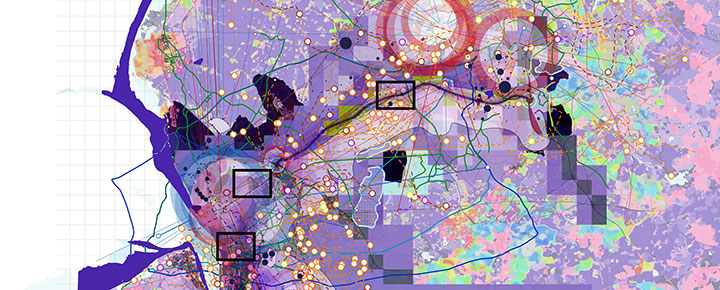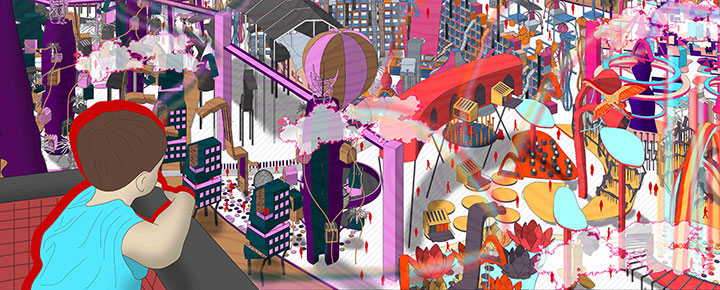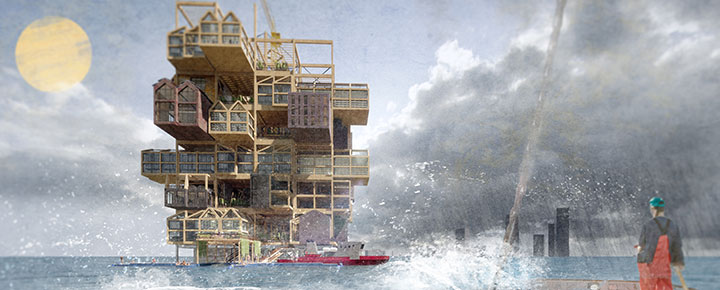The end of the academic calendar is always the opportune moment to reflect upon what has been achieved over the last twelve months. And what a year it has been! Enforced lockdown, working from home, and digital interaction with worldwide communication across many time zones have all been endured and enjoyed. The programme has refused to be assaulted by the global pandemic, the students have not been daunted by such circumstances and the staff have risen to the challenge. The MArch has adapted methods of teaching and learning to accommodate this extraordinary situation, we have creatively responded to the pandemic and developed strategies that encourage endeavour, promote wellbeing, and support scholarship.
Students have been reassured and emboldened to embrace the situation, not to mourn the lack of physical interaction but to enjoy the nearness that virtual interaction can provide. We have conducted group projects from different continents, have collaborated through the Internet, and resolved problems across oceans. We have always encouraged group working and collaboration, and this year, as always, we have welcomed visitors from many countries and different time zones, and actively enjoyed the diverse attitudes brought by distinct cultures.
The MArch programme is proud of its northern roots, to be situated in the heart of Manchester and part of the every more influential Northern Powerhouse. The links that the course has with the city through the profession, through the council and other organisations and of course through the local people are something to be immensely pleased with. But given these local connections, the programme also has an international outlook; over 40% of the MArch students are from overseas. We have students from China, Hong Kong, Japan, Malaysia, Singapore, India, Pakistan, Bangladesh, Nepal, the Middle East, the USA, Nigeria, and of course, across Europe from Finland to Greece.
Our annual Open Review was truly international this year with visitors making constructive and critical comments from the USA, China, and South America as well as from across Europe, the whole of Britain and of course, lots of interested and interesting professionals from Manchester. Equally the participating students were similarly scattered – some are based in Manchester, but many more have been learning remotely all year.
The Ateliers have international connections, whether these are collaborations with remote universities, competitions in foreign climates, and projects focussed upon different cultures. The research informed outward facing atelier system has excelled in the closeness of the digital environment. It has allowed many more visitors to virtually interact with the programme, visitors who may not otherwise be in a position to travel. The seven ateliers allow students to develop their own trajectory through the programme. The system supports the focussed development of the individual student. Thus the suite of ateliers provides richness and diversity combined with an ethos of transparency, openness and sharing.
The research-through-design projects that all students complete in their first year underpin the programme. This fundamental reinforcement allows the students to pursue their own interests in the second year, thus graduating with an agenda for their future professional life. The agenda that all students develop is supported and reinforced through the dissertation and research methods units. These research-informed projects definitely encourage deep enquiry and develop skills. While the overriding concern of the MSA Live project is to create social impact. It is student-led and unites the first year Master’s students with first and second year undergraduates in a festival of design and outward facing interaction. This year this programme was completely virtual, and so from the safety of their own homes, approximately 600 students worked with over 40 different partners to create two weeks of intense boundary pushing and beneficial projects.
Climate change has always been a driving element and is certainly embedded within the academic curriculum of the MArch programme. Not always through overt biometrics, but often much more subtly. Adaptive reuse of existing structures is inherently sustainable – less resources are needed, communities are retained, skills are preserved and the buildings updated for the needs of a 21st century population. Every single MArch student engages with the remodelling of existing buildings, all grapple with the fundamental problem of the relationship between old and new, and each develops an individual strategy for adaptive reuse. Housing and the requirements of changing populations are also tackled by all students during their first year on the programme. Differences in climate, locations, and needs are explored. The necessity to address climate change is a fundamental part of the programme; it is something that all students need to embrace, to fight for, and to develop creative methods for addressing.
The Programme has hosted a number of symposia. Invited speakers discussed subjects ranging from innovations within the adaptation of existing buildings, differing attitudes towards climate change, and creating atmosphere within architectural drawings. The teaching of Advanced Digital Design also moved entirely online. Informative recorded instructional sessions were supplemented with bookable one-to-one discussions with tutors. Thus the intensity that virtual interaction brings to all conversations has been fully exploited this academic year.
It was lovely to be able to invite recent graduates straight into the MArch programme. These students would normally expect to spend at least a year in practice between their undergraduate and post-graduate degrees, but given the understandable slowdown in the profession many chose to immediately continue with their education. To accommodate the lack of experience created by the want of professional practice, the programme has developed the Preparation for Practice (PREP) collection of activities. This includes an intensive week of meetings and talks with architects, summer-study sessions with professionals, and opportunities for practice observation. Given the on-going world-wide situation, we will offer the same opportunity to this year’s graduates. This supplements the regular professional networking and engagement events that the programme always stages.
The MArch programme has been gradually accommodating a vast increase in the number of students. To put this into context, just six years ago 80 students were recruited into the first year of the MArch, this year we welcomed over 260. Again the need to conduct tutorials and lectures virtually meant that it was quite straightforward to accommodate the increase. As we start to look forward to next year and the probable return to campus, it is good to know how successful this year has been, how we have worked so very hard to accommodate the situation, and how despite the circumstances it has been thoroughly enjoyable. What is important is to retain the good bits, build on the successes of enforced lockdown, and embrace the easy connections it has afforded. But saying this, it will be a great joy to be able to converse naturally within a crowded studio, serendipitously bump into people in the café, and actually physically pick up a well crafted model of a building.
This is my last year as the Programme Leader. After seven wonderful years I will step down at the end of this term. It has been an eventful journey. The programme has been transformed from an already thriving course into a highly successful, oversubscribed, outward facing, internationally relevant programme with a streamlined organisational system, contented academic staff and highly ambitious students. This was achieved through innovations in teaching, a radical overhaul of the structure, and the encouragement and trust that I place in my academic team. This successful approach has directly informed the elevated position that the school has recently occupied in the QS rankings. It has been a blast, but I know that the ambition, success, and thorough intellectual aspiration will continue, albeit in their own direction, with the Leaders elect: Vicky Jolley and Laura Sanderson.



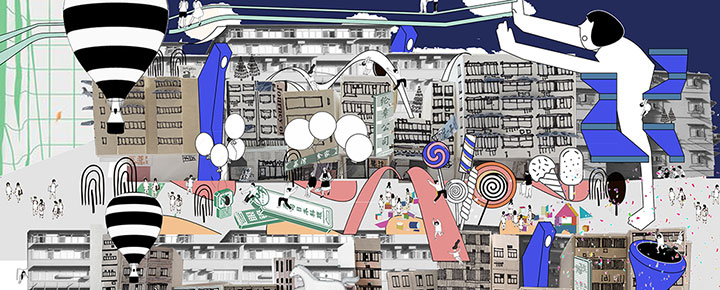
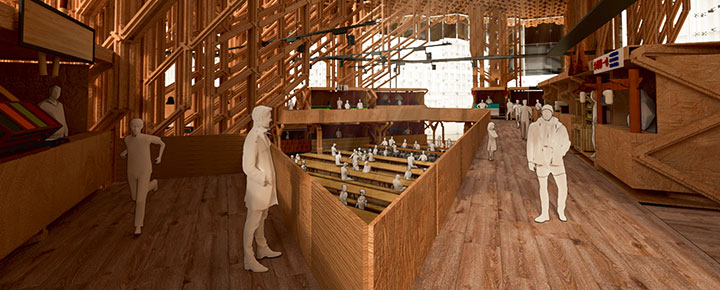
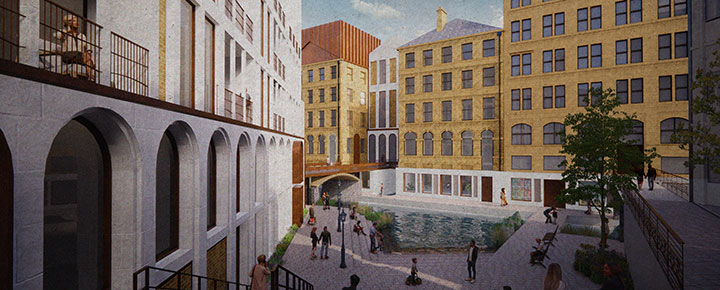
![[CPU]ai](/media/msaacuk/content/msa2021/c/c_march_cpuai.jpg)
